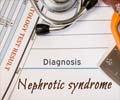
In patients with chronic kidney disease (CKD), blood levels of a hormone called fibroblast growth factor-23 (FGF-23) rise in parallel with declining kidney function, causing excess excretion of phosphorus in the urine. Also, FGF-23 has been consistently and strongly linked with heart disease and premature death, but the mechanisms behind these links are unclear.
Julie Dominguez, MD, Joachim Ix, MD (University of California San Diego, and Veterans Affairs San Diego Healthcare System) and their colleagues wondered whether the kidneys response to the hormonal actions of FGF-23 may play a role. To investigate, they measured blood levels of FGF-23 and urine levels of phosphorus in 872 patients with CKD and cardiovascular disease.
Among the major findings:
- During an average 7.5 years of follow-up, there were 337 deaths and 199 cardiovascular events, such as heart attacks and strokes.
- Urinary phosphorus excretion significantly modified FGF-23's links with premature death and heart disease. Patients who had above-average FGF-23 but below-average urinary phosphorus had the highest risks of both premature death and cardiovascular events.
The findings reveal that associations of FGF-23 with premature death and cardiovascular events are stronger in people with lower urinary phosphorus independent of kidney function. In these individuals, the kidney's response to FGF-23 may be suboptimal.
"The relative resistance to the hormonal actions of FGF-23 in the kidney may identify novel aspects of kidney dysfunction, which may hold prognostic information for adverse health," said Dr. Ix. "Future studies are needed to determine the mechanisms of relative kidney resistance, and to determine their prognostic implications for other outcomes such as progression of kidney disease."
Advertisement
Study co-authors include Michael Shlipak, MD and Mary Whooley, MD.
Advertisement
The article, entitled "Fractional Excretion of Phosphorus Modifies the Association Between FGF23 and Outcomes," will appear online at jasn.asnjournals.org on March 21, 2013, doi: 10.1681/2012090894.
The editorial, entitled "Fibroblast Growth Factor-23 and Outcomes: New Answers, New Questions," will appear online at /jasn.asnjournals.org/ on March 21, 2013, doi: 10.1681/ASN.2013020169.
The content of this article does not reflect the views or opinions of The American Society of Nephrology (ASN). Responsibility for the information and views expressed therein lies entirely with the author(s). ASN does not offer medical advice. All content in ASN publications is for informational purposes only, and is not intended to cover all possible uses, directions, precautions, drug interactions, or adverse effects. This content should not be used during a medical emergency or for the diagnosis or treatment of any medical condition. Please consult your doctor or other qualified health care provider if you have any questions about a medical condition, or before taking any drug, changing your diet or commencing or discontinuing any course of treatment. Do not ignore or delay obtaining professional medical advice because of information accessed through ASN. Call 911 or your doctor for all medical emergencies.
Founded in 1966, and with more than 13,500 members, the American Society of Nephrology (ASN) leads the fight against kidney disease by educating health professionals, sharing new knowledge, advancing research, and advocating the highest quality care for patients.
Source-Newswise














